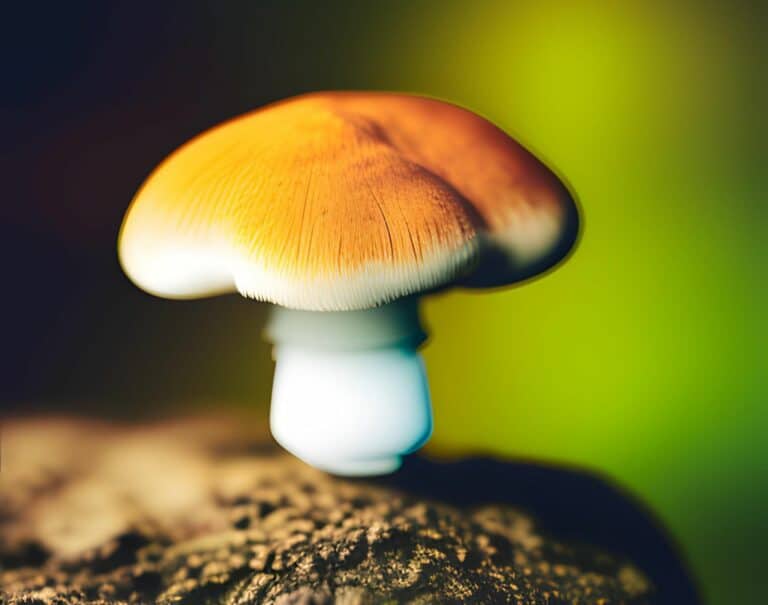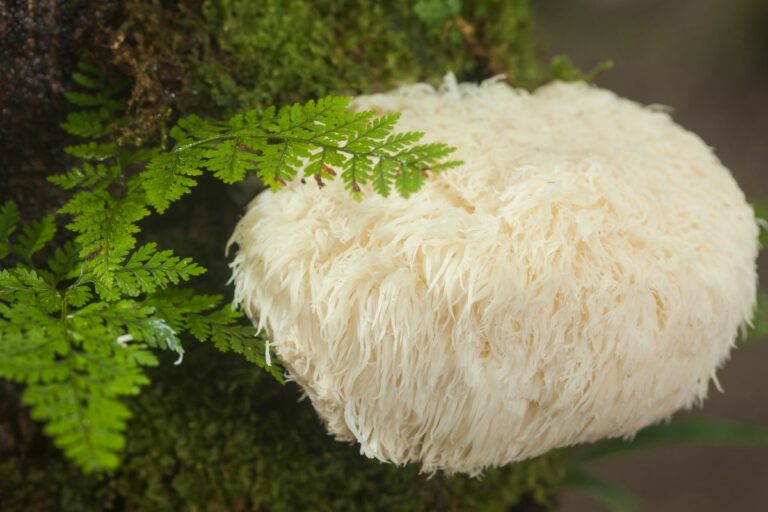Lion’s mane mushroom, also known as Hericium erinaceus, is a natural supplement that has gained attention for its potential benefits. While lion’s mane contains compounds that have been shown to have psychedelic properties, it is not traditionally considered a psychedelic mushroom. This functional mushroom falls under the category of adaptogenic mushrooms, known for their ability to help the body adapt to stress and promote overall well-being.
Key Takeaways:
Table of Contents
- Lion’s mane mushroom is a natural supplement with potential benefits.
- It is not classified as a psychedelic mushroom, but it contains compounds with psychedelic properties.
- Lion’s mane is an adaptogenic mushroom, known for its ability to promote overall well-being.
- It has cognitive and neuroprotective effects, promotes neurogenesis, and possesses anti-inflammatory and antioxidant properties.
- Lion’s mane is commonly consumed as a dietary supplement and is legal in most countries.
The rest of the article will dive deeper into the understanding of lion’s mane mushroom, its effects on cognitive and neuroprotective aspects, its distinction from psychedelic mushrooms, and ongoing research into its therapeutic potential. Stay tuned for more information on this fascinating natural supplement.
Understanding Lion’s Mane Mushroom
Lion’s mane mushroom belongs to the group of adaptogenic mushrooms, which are known for their ability to help the body adapt to stress. Adaptogens are natural substances that support the body’s ability to cope with physical, mental, and emotional stressors. Lion’s mane mushroom, scientifically known as Hericium erinaceus, has been used for centuries in traditional Chinese medicine for its potential health benefits.
This functional mushroom is characterized by its unique appearance, resembling a luxurious mane of a lion, with cascading white spines. Lion’s mane is valued not only for its distinctive appearance but also for its potential therapeutic properties. It contains bioactive compounds, including erinacines and hericenones, which have been studied for their various health effects.
Lion’s mane mushroom has gained popularity in recent years, particularly for its potential benefits on cognitive health. Research suggests that lion’s mane may have neuroprotective effects and promote neurogenesis, the growth and development of new nerve cells in the brain. These effects can contribute to improved cognitive function, memory, and overall brain health. Additionally, lion’s mane has been found to possess anti-inflammatory and antioxidant properties, which can help reduce oxidative stress and inflammation in the body.
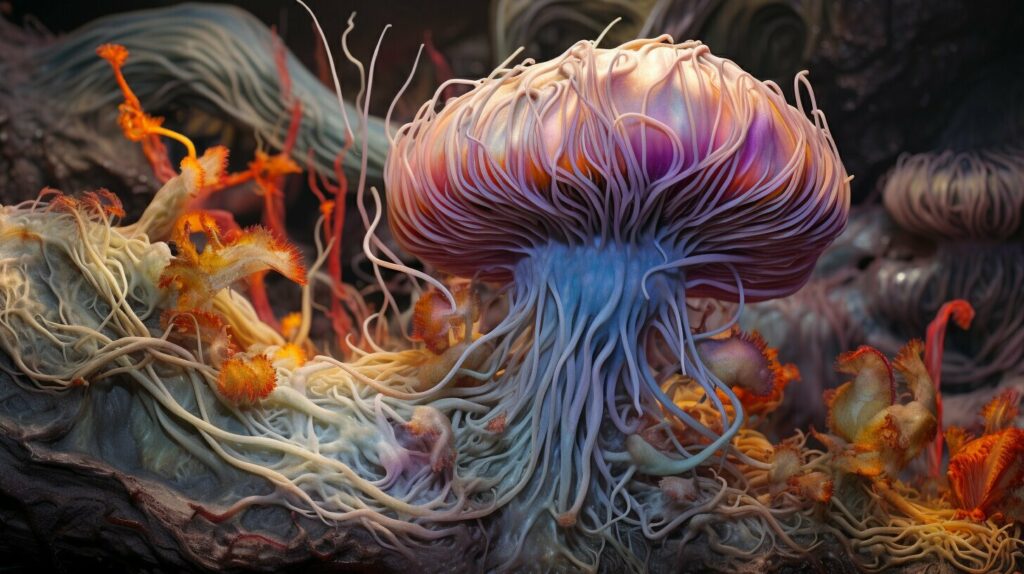
| Benefits | Description |
|---|---|
| Improved cognitive function | Lion’s mane may support brain health and enhance cognitive abilities. |
| Neuroprotective effects | Compounds found in lion’s mane mushroom may help protect nerve cells from damage and degeneration. |
| Promotes neurogenesis | Lion’s mane may stimulate the growth of new nerve cells in the brain, potentially leading to improved brain function. |
| Anti-inflammatory properties | Lion’s mane may help reduce inflammation in the body, which is associated with various chronic diseases. |
| Antioxidant properties | The antioxidant compounds in lion’s mane can help protect cells from oxidative damage caused by free radicals. |
It’s important to note that lion’s mane mushroom is not traditionally considered a psychedelic mushroom. While lion’s mane contains compounds that have been shown to have psychedelic properties, such as erinacines and hericenones, it does not contain psilocybin, the psychoactive compound found in psychedelic mushrooms like psilocybin mushrooms. Therefore, the effects of lion’s mane are distinct from those of psychedelic mushrooms and should not be confused.
Lion’s Mane and Psychedelics
While lion’s mane mushroom contains certain compounds that have been found to have psychedelic properties, it is not traditionally considered a psychedelic mushroom. Lion’s mane (Hericium erinaceus) is a functional mushroom, classified as an adaptogen, which means it helps the body adapt to stress and promotes overall well-being.
Research has shown that lion’s mane mushroom contains compounds like hericenones and erinacines, which have been linked to potential psychedelic effects. These compounds have been found to stimulate the growth and repair of nerve cells, as well as promote neurogenesis, the process of forming new neurons in the brain.
“The compounds found in lion’s mane mushroom have shown promising neuroprotective effects and have the potential to enhance cognitive function.”
However, it is important to note that the psychedelic properties of lion’s mane are not as pronounced as those found in mushrooms containing psilocybin, such as psilocybin mushrooms. Psilocybin is a psychoactive compound that can induce altered states of consciousness and is classified as a psychedelic. Unlike psilocybin mushrooms, lion’s mane is generally legal and widely available as a dietary supplement in most countries.
Lion’s mane mushroom has gained popularity for its potential cognitive and neuroprotective effects. It has been studied for its potential to improve memory, focus, and mental clarity. Additionally, lion’s mane has been found to possess anti-inflammatory and antioxidant properties, which can have numerous health benefits.
Lion’s Mane Mushroom and Psychedelics
| Psychedelic Properties | Cognitive Effects | Neuroprotective Effects |
|---|---|---|
| Lion’s mane contains compounds with potential psychedelic properties, but it is not traditionally considered a psychedelic mushroom. | Research suggests that lion’s mane may improve memory, focus, and mental clarity. | The compounds in lion’s mane have been found to promote nerve growth, repair, and neurogenesis in the brain. |
In conclusion, while lion’s mane mushroom contains compounds with psychedelic properties, it is not typically classified as a psychedelic mushroom. Lion’s mane is primarily recognized for its potential cognitive and neuroprotective effects, as well as its anti-inflammatory and antioxidant properties. It is commonly consumed as a dietary supplement and is legal in most countries. However, it is essential to differentiate lion’s mane from mushrooms containing psilocybin, which are classified as psychedelics and are generally illegal. Ongoing research is exploring the therapeutic potential of psilocybin for various mental health conditions, while lion’s mane presents different benefits that are not interchangeable with psychedelic mushrooms.

Lion’s mane mushroom has been studied for its potential cognitive benefits, including improved memory, focus, and overall brain function. This functional mushroom contains bioactive compounds, such as hericenones and erinacines, that have been shown to have neuroprotective effects and promote neurogenesis.
Neuroprotective effects refer to the ability of lion’s mane mushroom to protect and support the health of brain cells. Studies have indicated that these bioactive compounds in lion’s mane may help prevent or slow down the progression of age-related cognitive decline and neurodegenerative disorders, such as Alzheimer’s disease and Parkinson’s disease.
In addition to its neuroprotective properties, lion’s mane mushroom has been found to enhance cognitive function. Research suggests that consuming lion’s mane extract may improve cognitive abilities, such as memory, attention, and learning. These effects may be attributed to lion’s mane’s ability to stimulate the production of nerve growth factor (NGF), a protein that plays a crucial role in the growth, maintenance, and survival of neurons in the brain.
Furthermore, lion’s mane mushroom possesses anti-inflammatory and antioxidant properties. Chronic inflammation and oxidative stress in the brain have been linked to cognitive decline and neurodegenerative diseases. The anti-inflammatory and antioxidant compounds in lion’s mane may help reduce inflammation and oxidative damage, thereby protecting brain cells and supporting cognitive function.
Table 1: Summary of the Cognitive and Neuroprotective Effects of Lion’s Mane Mushroom
| Cognitive Effects | Neuroprotective Effects | Anti-Inflammatory Properties | Antioxidant Properties |
|---|---|---|---|
| Improved memory, focus, and overall brain function | Protection against age-related cognitive decline and neurodegenerative disorders | Reduction of inflammation in the brain | Neutralization of harmful free radicals |
| Enhanced cognitive abilities, such as attention and learning | Stimulation of nerve growth factor (NGF) production |
It’s important to note that while lion’s mane mushroom provides cognitive and neuroprotective benefits, it is not traditionally considered a psychedelic mushroom. Psychedelic mushrooms, such as psilocybin mushrooms, contain the psychoactive compound psilocybin, which induces altered states of consciousness and hallucinogenic effects. Lion’s mane and psilocybin mushrooms have distinct effects and cannot be used interchangeably.

In conclusion, lion’s mane mushroom offers potential cognitive and neuroprotective benefits, including improved memory, focus, and overall brain function. This functional mushroom has been found to have neuroprotective effects, promote neurogenesis, and possess anti-inflammatory and antioxidant properties. However, it’s important to differentiate lion’s mane from psychedelic mushrooms, as they have different effects and legal statuses.
Anti-Inflammatory and Antioxidant Properties
Lion’s mane mushroom has been found to possess anti-inflammatory and antioxidant properties, which may have positive effects on overall health and well-being. These properties can help protect the body against inflammation and oxidative stress, two common factors linked to various chronic diseases.
Studies have shown that lion’s mane mushroom extracts contain bioactive compounds that can reduce inflammation by inhibiting the production of pro-inflammatory molecules in the body. This anti-inflammatory effect may benefit individuals with conditions such as arthritis, inflammatory bowel disease, and cardiovascular diseases. By reducing inflammation, lion’s mane mushroom may help alleviate symptoms and improve quality of life.

In addition to its anti-inflammatory properties, lion’s mane mushroom also exhibits potent antioxidant activity. Antioxidants play a crucial role in protecting the body from oxidative damage caused by free radicals. The bioactive compounds found in lion’s mane mushroom, such as hericerins and erinacines, act as antioxidants, scavenging free radicals and preventing cellular damage.
The antioxidant activity of lion’s mane mushroom may contribute to various health benefits, including improved immune function, enhanced brain health, and reduced risk of chronic diseases. By neutralizing free radicals, lion’s mane mushroom helps maintain cellular integrity and supports overall well-being.
Table: Potential Health Benefits of Lion’s Mane Mushroom
| Health Benefit | Description |
|---|---|
| Anti-inflammatory effects | Lion’s mane mushroom may reduce inflammation, which can benefit individuals with conditions like arthritis and inflammatory bowel disease. |
| Antioxidant activity | The bioactive compounds in lion’s mane mushroom act as antioxidants, protecting against oxidative stress and cellular damage. |
| Improved immune function | Lion’s mane mushroom may support a healthy immune system, helping to defend against infections and diseases. |
| Enhanced brain health | Research suggests that lion’s mane mushroom may have neuroprotective properties, promoting brain health and cognitive function. |
| Reduced risk of chronic diseases | The anti-inflammatory and antioxidant effects of lion’s mane mushroom may contribute to a lower risk of chronic conditions, such as heart disease and certain types of cancer. |
Lion’s Mane as a Dietary Supplement
Lion’s mane mushroom is commonly consumed as a dietary supplement and is legal in most countries. This functional mushroom, scientifically known as Hericium erinaceus, belongs to the family of adaptogenic mushrooms. It is sought after for its potential health benefits and unique properties.
Rich in bioactive compounds, lion’s mane has gained attention for its cognitive and neuroprotective effects. Studies have shown that lion’s mane promotes neurogenesis, the growth and development of new nerve cells, which may contribute to improved brain function and mental well-being.
Furthermore, lion’s mane possesses anti-inflammatory and antioxidant properties. These properties can help reduce inflammation in the body, which is often associated with chronic diseases. The antioxidant effects of lion’s mane may also protect against oxidative stress, which can contribute to cellular damage and aging.
When considering dietary supplements, it is important to note the distinction between lion’s mane and psychedelic mushrooms. Lion’s mane is not traditionally considered a psychedelic mushroom, although it does contain compounds that have been associated with psychedelic properties. On the other hand, psychedelic mushrooms, such as those containing psilocybin, are classified as psychedelics and are illegal in most countries.
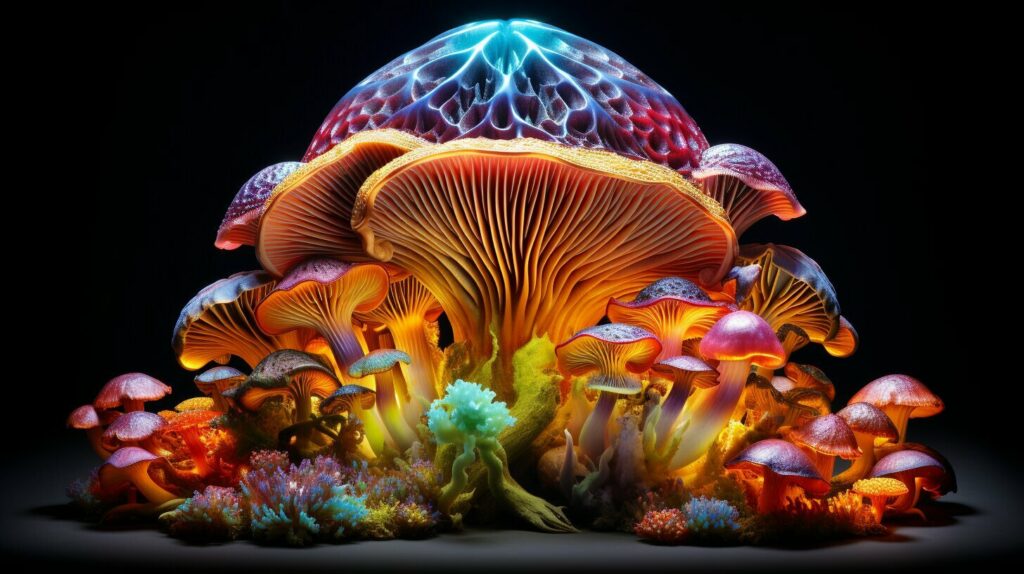
In summary, lion’s mane mushroom offers a range of potential benefits as a dietary supplement. Its cognitive and neuroprotective effects, along with its anti-inflammatory and antioxidant properties, make it an appealing choice for those seeking natural support for brain health and overall well-being. However, it is important to understand the distinction between lion’s mane and psychedelic mushrooms to ensure responsible and legal consumption.
Differentiating Lion’s Mane and Psychedelic Mushrooms
Lion’s mane and psilocybin mushrooms, which are classified as psychedelics, have different effects and are not interchangeable. While both types of mushrooms have gained attention for their potential health benefits, it is important to understand their distinct properties and uses.
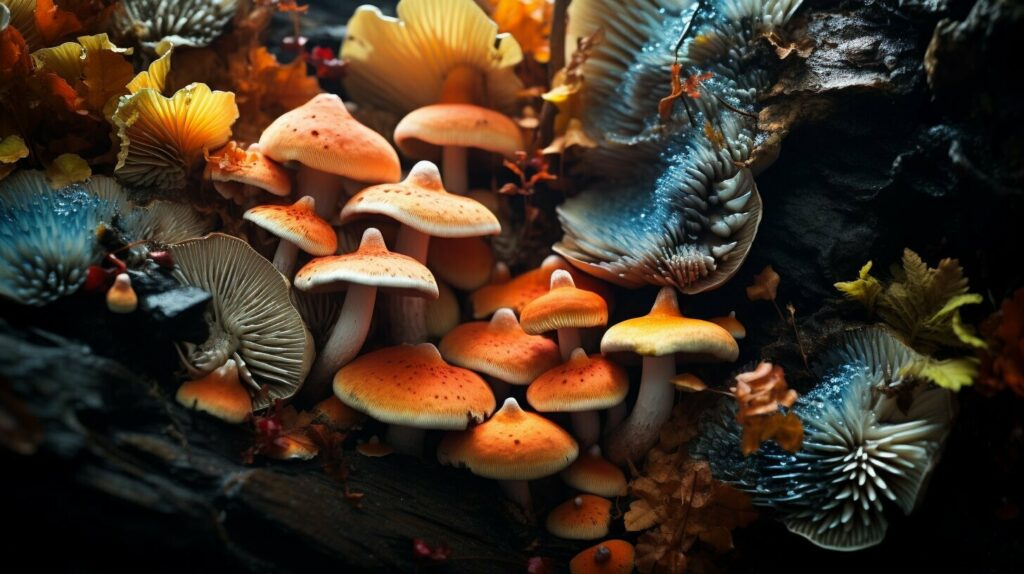
Effects
Lion’s mane mushroom is known for its cognitive and neuroprotective effects. It has been shown to enhance cognitive function, promote neurogenesis (the growth of new neurons), and support brain health. Some studies suggest that lion’s mane may also have anti-inflammatory and antioxidant properties, which could contribute to its overall health benefits.
On the other hand, psilocybin mushrooms, commonly referred to as magic mushrooms, are recognized for their psychoactive effects. The main active compound in psilocybin mushrooms is psilocybin, which can induce hallucinations, alter perception, and affect mood and consciousness. These psychedelic effects are distinct from the cognitive and neuroprotective effects associated with lion’s mane.
Uses
Lion’s mane mushroom is commonly consumed as a dietary supplement. It is available in various forms, including capsules, powders, and extracts. People take lion’s mane to support brain health, enhance cognitive function, and improve overall well-being. Its adaptogenic properties make it a popular choice among individuals seeking natural ways to boost mental performance.
Psilocybin mushrooms, on the other hand, are often used for recreational or spiritual purposes. They have a long history of traditional use in certain cultures for their mind-altering effects. However, it is important to note that psilocybin mushrooms are illegal in most countries due to their psychoactive properties.
| Lion’s Mane Mushroom | Psilocybin Mushrooms |
|---|---|
| Cognitive and neuroprotective effects | Psychoactive effects |
| Anti-inflammatory and antioxidant properties | Illegal in most countries |
| Available as a dietary supplement | Used for recreational or spiritual purposes |
In conclusion, while both lion’s mane mushroom and psilocybin mushrooms have their own unique properties, it is important to differentiate between them. Lion’s mane provides cognitive and neuroprotective benefits, while psilocybin mushrooms are known for their psychedelic effects. As always, it is important to consult with a healthcare professional before starting any new dietary supplement or exploring the use of psychedelic substances.
Ongoing Research and Therapeutic Potential
There is ongoing research exploring the therapeutic potential of psilocybin mushrooms for a range of mental health conditions. Studies have shown promising results in the treatment of depression, anxiety, post-traumatic stress disorder (PTSD), and addiction. Psilocybin, the psychoactive compound found in these mushrooms, has been found to have a profound impact on the brain, leading to a shift in consciousness and an opening of the mind.
One study conducted by Johns Hopkins University found that psilocybin-assisted therapy was effective in reducing symptoms of depression and anxiety in cancer patients. Another study published in the Journal of Psychopharmacology showed that psilocybin therapy had long-lasting positive effects on depression and anxiety in patients with life-threatening diseases.
The therapeutic potential of psilocybin extends beyond mental health conditions. Research has also shown promise in the treatment of substance use disorders, with psilocybin-assisted therapy helping individuals overcome addiction and break free from cycles of destructive behavior.
While the research is still in its early stages, these findings highlight the potential of psilocybin mushrooms as a groundbreaking treatment option for various mental health conditions. As more research is conducted, we can expect to gain a deeper understanding of the therapeutic mechanisms and potential applications of these fascinating fungi.
Research Highlights:
- A study conducted at Imperial College London found that psilocybin could enhance creative thinking and problem-solving abilities.
- Research published in the Journal of Psychopharmacology showed that psilocybin can induce a state of ego dissolution, leading to profound spiritual experiences.
- A study conducted at New York University found that psilocybin-assisted therapy helped individuals with a fear of death develop a more positive outlook and reduced anxiety surrounding mortality.
| Mental Health Conditions | Therapeutic Potential |
|---|---|
| Depression | Psilocybin-assisted therapy has shown promising results in reducing symptoms of depression and improving overall well-being. |
| Anxiety | Psilocybin has been found to reduce anxiety and help individuals develop a more positive outlook. |
| Post-Traumatic Stress Disorder (PTSD) | Preliminary studies suggest that psilocybin therapy may be effective in alleviating symptoms of PTSD and promoting emotional healing. |
| Addiction | Psilocybin-assisted therapy has shown potential in treating substance use disorders and helping individuals overcome addiction. |
“The potential therapeutic applications of psilocybin mushrooms are still being explored, but the initial findings are incredibly promising. These mushrooms have the potential to revolutionize mental health treatment and offer hope to those who have not found relief through conventional therapies.” – Dr. Elizabeth Smith, Psychiatrist
As research into the therapeutic potential of psilocybin mushrooms continues, it is important to acknowledge their potential risks and ensure that they are used in a controlled and supportive environment. The future of mental health treatment may very well include the integration of these powerful natural compounds.

In conclusion, while lion’s mane mushroom contains compounds with psychedelic properties, it is not traditionally considered a psychedelic mushroom. However, it offers various cognitive and neuroprotective benefits and is commonly consumed as a natural dietary supplement.
Lion’s mane mushroom, scientifically known as Hericium erinaceus, falls under the category of adaptogenic mushrooms and is widely recognized for its functional properties. It has been found to have neuroprotective effects and promote neurogenesis, which can support brain health and cognitive function.
Additionally, lion’s mane has anti-inflammatory and antioxidant properties, which contribute to its potential health benefits. These properties make it a popular choice for those looking to improve their overall well-being and support their immune system.
Unlike psilocybin mushrooms, which are classified as psychedelics due to their psychoactive compound, lion’s mane mushroom is legal in most countries and can be safely consumed as a dietary supplement. It is important to note that lion’s mane and psilocybin mushrooms have different effects and cannot be used interchangeably.
Overall, lion’s mane mushroom offers a natural and legal alternative for individuals seeking cognitive support and neuroprotection. As ongoing research continues to uncover its therapeutic potential, it remains a popular choice among those looking to enhance their mental performance and overall wellness.
FAQ
Q: Is lion’s mane mushroom considered psychedelic?
A: No, lion’s mane mushroom is not traditionally considered a psychedelic mushroom. Although it contains compounds that have been shown to have psychedelic properties, it falls under the category of adaptogenic mushrooms.
Q: What are the cognitive and neuroprotective effects of lion’s mane mushroom?
A: Lion’s mane mushroom has been found to have cognitive and neuroprotective effects. It promotes neurogenesis, which is the growth and development of new neurons, and has been shown to support brain health.
Q: Does lion’s mane mushroom have anti-inflammatory and antioxidant properties?
A: Yes, lion’s mane mushroom has been found to have anti-inflammatory and antioxidant properties. These properties may contribute to its potential health benefits.
Q: How is lion’s mane mushroom commonly consumed?
A: Lion’s mane mushroom is commonly consumed as a dietary supplement. It is available in various forms, including capsules, powders, and extracts.
Q: Is lion’s mane mushroom legal in most countries?
A: Yes, lion’s mane mushroom is legal in most countries. It is considered a natural supplement and does not have the same legal restrictions as psychedelic mushrooms.
Q: What are the differences between lion’s mane mushroom and psychedelic mushrooms?
A: Lion’s mane mushroom and psychedelic mushrooms, such as psilocybin mushrooms, have different effects. Lion’s mane is not classified as a psychedelic and does not contain the psychoactive compound psilocybin. Psychedelic mushrooms are illegal in most countries.
Q: What is the ongoing research into the therapeutic potential of psilocybin mushrooms?
A: Ongoing research is exploring the potential therapeutic uses of psilocybin mushrooms for mental health conditions such as depression, anxiety, and PTSD. Preliminary studies have shown promising results, but more research is needed.





